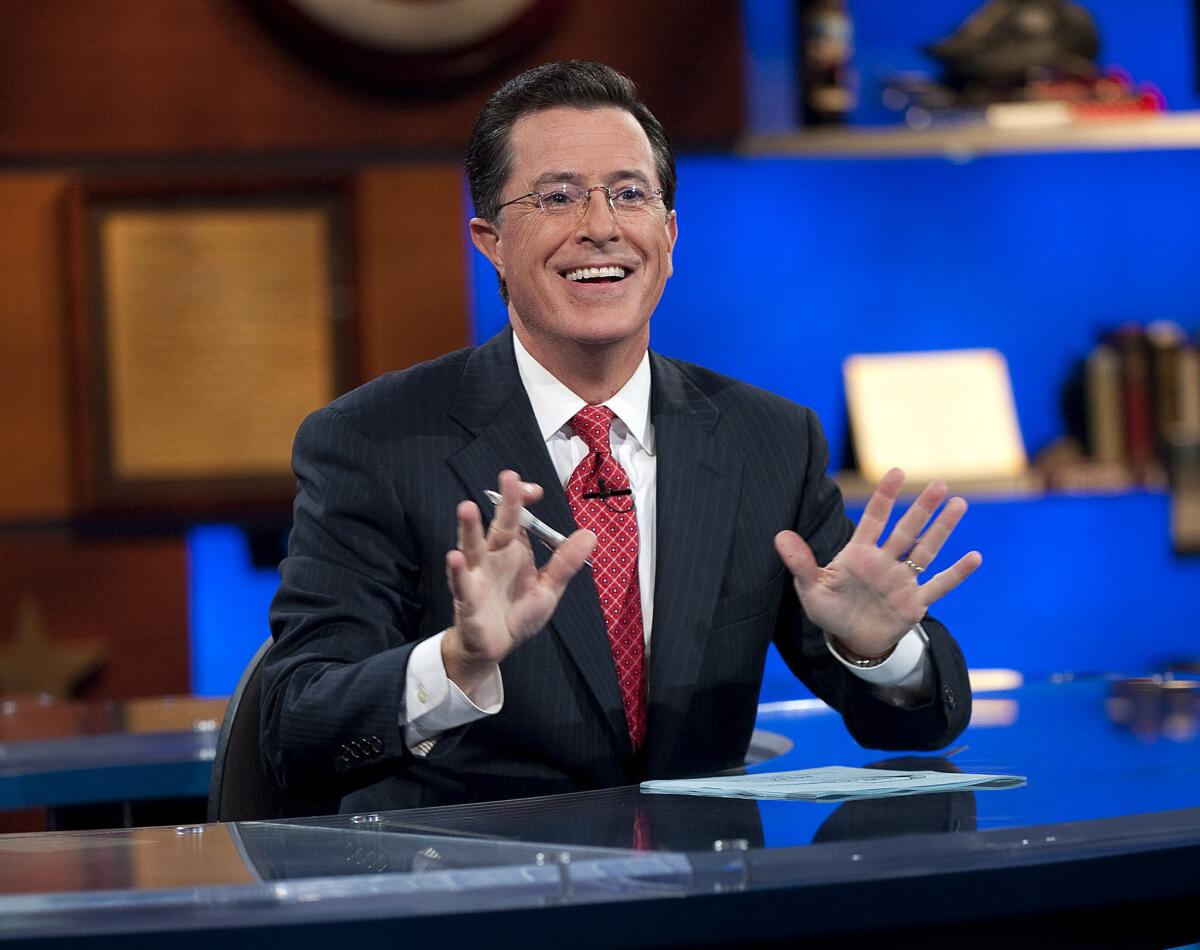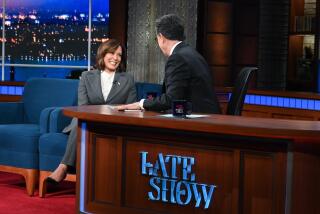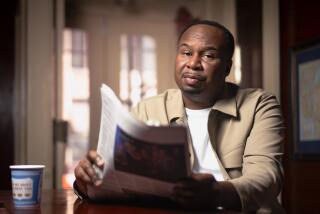Stephen Colbert is not a conservative pick for CBS’ ‘Late Show’

With Stephen Colbert joining CBS, late-night TV’s generational shift is complete — and the real battle for viewers, onscreen and online, can begin.
America’s most-watched network announced Thursday that it had picked Colbert, the 49-year-old host of Comedy Central’s news sendup “The Colbert Report,” as the next host of “Late Show.” Details of the show, including a start date and its location, have not been revealed. But CBS and Colbert confirmed that he will do the show as himself — and not in his current character, a bumptious right-wing talk host.
The move came just the week after “Late Show’s” founding host, 66-year-old David Letterman, announced his retirement, and two months after Jimmy Fallon took over NBC’s legendary “The Tonight Show.”
PHOTOS: Stephen Colbert’s journey to ‘The Late Show’
Colbert’s show is the least-watched of the major late-night talk hosts, but CBS rushed to pluck him from cable because of his proven appeal with young people. He’s a hit on college campuses, has fronted several bestselling books and — maybe most important as he squares off against the Web-savvy Fallon, who is 39 — his clips do heavy traffic online.
“One name stood out above the rest, and that was Stephen,” CBS Entertainment Chairman Nina Tassler said in a phone interview, adding that the network had had some preliminary discussions with Colbert after Letterman extended his deal for two years in 2013. Indeed, Letterman himself — who has booked Colbert as a guest 12 times on “Late Show” — gave his blessing to Colbert’s selection before it was announced, Tassler added.
But the speed of the deal surprised nearly everyone, not least the top Comedy Central executives whom Colbert told on Wednesday.
The CBS choice does not come without risk. The oldest-skewing network is making a generational hedge. Colbert is a baby boomer, albeit among the very youngest of them; his main rivals, Fallon and ABC’s Jimmy Kimmel, belong to Generation X.
PHOTOS: David Letterman’s memorable guests
In contrast to the typical broadcaster who strives to appeal to as wide an audience as possible, Colbert’s act has irked partisans on both sides of the aisle. Conservatives annoyed by his frequent tweaking of right-wing talking points are already ruffled that CBS picked him, with radio’s Rush Limbaugh telling listeners Thursday that CBS had “declared war on the heartland.”
Fox News host Bill O’Reilly — widely considered the inspiration for Colbert’s Comedy Central show character — earlier this week attacked Colbert as a left-wing “deceiver.” But liberals aren’t always happy with him, either; a tweeted joke about Asian American stereotypes from a segment lampooning racial insensitivity wasn’t appreciated by critics who launched an unsuccessful bid to get his show dumped earlier this year.
More important, there is the sense that the wee hours are just getting too crowded with sofas and microphones. The format may need some shaking up, in ways as yet undefined. Tassler said that CBS has yet to decide on a new executive producer for “Late Show,” who along with the host and head writer will be the key parties responsible for creative direction.
“Late-night TV is just not what it was in terms of the audience,” said David Bianculli, professor at Rowan University and editor of TVWorthWatching.com. “The more that Colbert makes it a traditional show, the less I think he’s going to have an audience.”
WATCH: Stephen Colbert’s memorable moments
Colbert’s pick is likely not the best news for ABC’s Kimmel, who was promoted last year to the 11:35 p.m. slot but has already struggled for attention as Fallon took over the top-rated “Tonight.” Also left in the lurch is Craig Ferguson, the offbeat, Scottish-born comic who occupies the post-Letterman slot at CBS but didn’t get the nod for “Late Show.” Both Kimmel and Ferguson congratulated Colbert in tweets on Thursday.
Colbert’s exit leaves a hole in Comedy Central’s nightly lineup, but Jon Stewart — a Colbert mentor who will remain in his “Daily Show” chair — voiced support for his move to a broader audience. “He’s got gears he hasn’t even shown people yet,” Stewart told the entertainment news website Vulture.
In picking Colbert, CBS was in a sense staying within its corporate roots. Comedy Central is a unit of Viacom, which until 2005 controlled CBS (the network and selected other assets were spun off as an independent unit then). Both CBS and Viacom are overseen by 90-year-old mogul Sumner Redstone.
But the broadcast home of such fare as “NCIS” and “60 Minutes” had to look outside its own studios for proven talent. It does not have a farm team for late-night hosts, as NBC has with its sketch show “Saturday Night Live.” Both Fallon and the host who now follows him, Seth Meyers, hail from “SNL.”
PHOTOS: David Letterman: Career in pictures
“He was the best guy available for CBS,” said Brad Adgate, analyst for ad firm Horizon Media. Colbert also has a comfort level with Madison Avenue. That’s a key concern for CBS, whose revenue depends on selling commercial time. During this year’s Super Bowl, Colbert premiered a campaign for Wonderful Pistachios, proving his mettle as a pitchman.
“Advertisers will be fine with him,” Adgate predicted.
Colbert is a South Carolina native who came up through sketch comedy and first won fame as one of the faux reporters on Stewart’s “Daily Show.” He wins high praise from colleagues and critics for his ability to think on his feet, interviewing skills and performance savvy. Almost unique among major late-night hosts, Colbert, a Sunday school teacher who jokingly refers to himself as “America’s most famous Catholic,” has been unafraid to invoke his faith in discussing major issues of the day.
He’s also been fearless in taking on controversial political matters: He founded the Colbert SuperPAC and attempted to enter the 2012 South Carolina Republican primary in an elaborate statement about the influence of money on politics in the wake of the Supreme Court’s Citizens United ruling.
He is also a musical-theater fan and has even showcased a better-than-passable singing voice in duets with guests such as Dolly Parton and Harry Belafonte. And his character’s silly, deliberately over-the-top self-promotion (such as the running bit “Who’s Honoring Me Now?”) have only heightened his fame in the reality TV age. “We had to find someone who could honor Dave’s legacy,” Tassler said. “Stephen is an extraordinarily intelligent, imaginative performer.”
PHOTOS: Talk show hosts who didn’t make the cut
All this has given Colbert a die-hard fan base that belies his show’s relatively small ratings. A YouTube video of his notorious speech at the 2006 White House Correspondents’ Assn. dinner — where he roasted a visibly uncomfortable President George W. Bush — has been viewed more than 1.1 million times. Colbert’s personal Twitter account has more than 6 million followers.
For all that, viewers know little about Colbert because he has until now rarely broken character; an exception occurred last year, when he told Oprah Winfrey about the 1974 plane crash that killed his father and two older brothers.
But now CBS, and the TV business at large, has a lot riding on the answer to whether viewers will like the real guy as opposed to the fake one. “He will be able to make the transition seamlessly,” Bianculli said. “The question is whether the audience will follow him.”
Collins reported from Los Angeles and Blake from New York.
More to Read
The complete guide to home viewing
Get Screen Gab for everything about the TV shows and streaming movies everyone’s talking about.
You may occasionally receive promotional content from the Los Angeles Times.







